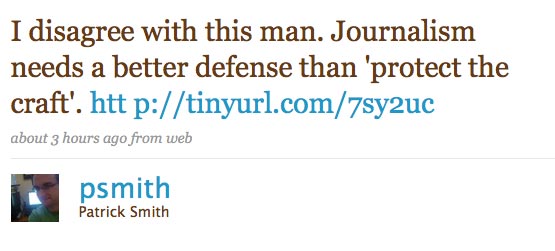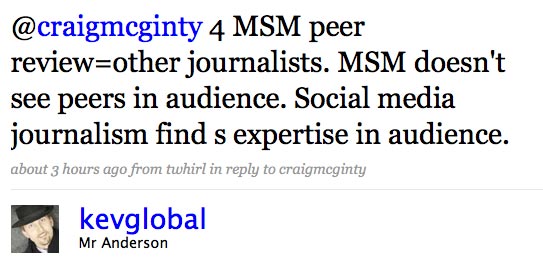Paul Mason, economics editor of BBC’s Newsnight and National Union of Journalist (NUJ) rep for the programme, gives some fairly frank thoughts to the union on journalism, its future and its relation to new technologies and forms of publishing in the video interview below.
“What you have to do is to try and define what the skilled class of professional journalist actually does in that world. What makes us worth employing? We are the ones who provide accurate information: we’re not going to disappear,” he says, before asking how many bloggers can be described as authoritative.
Discussing recent journalism job losses, Mason argues that this is not the result of just the recession, but has been caused by ‘deskilling and the rise of new technology’.
Accuracy, authority and the peer review mechanism of the newsroom will safeguard journalism’s future, he adds.
“A newsroom is a real-time peer review system – that bloggers in their pyjamas can’t replicate.”
Is this really the case? Mason’s views have sparked some reactions among journo-bloggers, including Kevin Anderson and Patrick Smith:


Your thoughts please.
If this is the state of the nation message on British journalism then we are in big trouble. Time for deskbound computer tied journos of all hues to get out more. The interview was very depressing and to cap it all he hails from North of Watford; so has the mandatory BBC regional mancunian type twang…Happy New Year…opens a bottle of Fullers London Pride…all is well with the world!
There’s a neat contradiction here. It seems Paul Mason’s receiving more of a peer review online than he could ever get in a newsroom. (That’s unless he only sees other BBC hacks as his peers.)
Anyway, arguments focused on the quality of journalism seldom succeed against the power of economics, although the Beeb is different. It isn’t a commercial organisation. Elsewhere media companies are generally driven to by cost with quality falling a poor second.
Mason’s argument reminds me of what was said about the threats to journalistic standards when News International abandoned Fleet Street. Quality probably did suffer following the forced march away from peer review establishments such as El Vinos, the Cheshire Cheese and the Kings and Keys. But the sober hacks were able to churn out more copy when they were locked in Fortress Wapping than they ever had before. Sales didn’t suffer that much either.
As long as journalists simply dismiss “pyjama-clad bloggers” we won’t get anywhere. If there’s an audience for a person or organisation it really doesn’t matter what they wear.
Pingback: Interesting stuff for Monday by andydickinson.net
Maybe that was Andrew Gilligan’s problem on THAT Today Programme report. If only he’s been in the newsroom rather than ‘working from home’.
I am not attempting to sum up a defence of journalism in this interview: I am trying to define what the future is for the union. Hopefully many of you will be union members: if so you will know that there is a debate about what to do in the face of new technology. The essence of my argument is that the union has to be an organisation that engages the media bosses about their agenda, and becomes the collective brain of the workforce, policing and extending what industrial relations experts once called “the frontier of control”. Because the interview was for the union website it took a lot of things for granted. Those of you who know my work will know I am not anti-blogging: I am pro it – and I mean real blogging not the ersatz blogs the BBC lets us do. But I reject the theory that social media will simply destroy journalism; and that skill and status and above all income (!) cannot be defended in a world of easy-to-use technology. I certainly don’t dismiss bloggers. However I think their limitations are being exposed, just as journalists’ limitations are.
Pingback: links for 2009-01-06 « Common User
Pingback: Paul Mason on blogging and peer reviews « Alice Talks
The difficulty with peer review is that it not only excludes the unexpert but also the occasional person so much more “expert” than his/her presumed peers that they cannot immediately understand him. In science it is a perennial problem typified by the treatment not just of Galileo but of Royal Society member Oliver Heaviside, inventor of the theory of electric circuit dynamics.
The difficulty with blogs is that the occasional expert contribution gets localised and lost in a sea of waffle, much as happened to interpretation of peer reviewed translations of the Bible after the invention of printing.
On both counts, Paul etc need to be privately accessible.